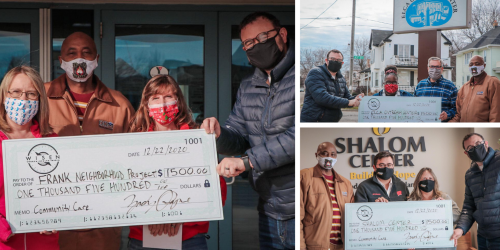
A few days before Christmas, Payne (in black jacket) and Lay Pastor, George Andrews III (in brown jacket), showed up at the doorsteps of three organizations with checks for $1,500 each. Photo credit: Allison Payne
It wasn’t long after Kenosha was thrust into the international spotlight after a police officer shot Jacob Blake in the back, triggering protests which sometimes turned violent and destructive, that local church leaders began looking for ways to help.
On a Sabbath last August, members of the Kenosha, Racine and Raymond churches gathered in downtown Kenosha to pray for the wounded community and later spread out into Kenosha to volunteer in support of local clean-up efforts. That event attracted local media and Zack Payne, head network pastor for Wisconsin Southeastern Network (WISEN) Seventh-Day Adventist churches was quoted saying, “We wanted to come together and show some unity in Christ so we can unify with our community and help. It’s a display of unity that we’re all able to come together and accomplish something — we’re here and we care.”
The community was already hurting long before the protests. Kenosha, located halfway between Chicago and Milwaukee with a population of 160,000 has seen its economy, not unlike several Midwestern cities, struggle over the years. According to U.S. Census data, unemployment stands at 10%. One in every 5.3 resident lives in poverty.
Payne says his leadership team wanted to do a follow up to the successful community outreach but with the coronavirus raging across Wisconsin, they found themselves with limited options in what they could do. As they scanned the area, they saw that there were organizations already making meaningful change. The WISEN leadership decided to join forces with three of those groups.
Armed with a $6,000 donation from the Lake Union and Wisconsin Conference, Payne and Lay Pastor, George Andrews III, showed up at the doorsteps of the organizations a few days before Christmas with checks for $1,500 each. “They seemed to be doing a lot of good, so we were able to give to them with confidence,” says Payne. (The remaining funds were used to pay some expenses they incurred for the August event.)
The Kenosha YMCA/Frank Neighborhood Project is putting the funds toward an after-school tutoring program at the Frank Elementary School. They’re currently assisting 72 students in improving their math and reading scores. “This [donation] is a tremendous blessing,” notes Rachel Mall, the Y’s Youth and Family director. “Everybody is struggling financially so this money will help us continue the program.”
Karl Erickson, executive director of the Evangelical Lutheran Church of America Outreach Center (ELCA), says he wasn’t expecting the windfall, but he, too, is grateful. ELCA is a faith-based non-profit, focusing on sharing God’s love and its mission is to help residents become self-sufficient. However, with services curtailed because of the pandemic, they’re focusing on the immediate need of providing warm clothing. Erickson says they have already used the money to buy hats and gloves. He continues, “We needed this!”
The Shalom Center of the Interfaith Network’s is the largest food distributor and homeless shelter in Kenosha, providing 72,000 meals last year through their soup kitchen network and 21,000 shelter nights to single households and families. The center’s executive director, Tamarra Coleman, says they were especially humbled to receive the unsolicited and unrestricted funds from another local organization. “Last year was a rough year and so many fundraisers were cancelled,” she explains. “For them to think of the Shalom Center is huge. We have a great community.”
Payne, who has pastored in the area for almost four years, says “We are just grateful to be a light to our community.”
Debbie Michel, Lake Union associate director of Communication